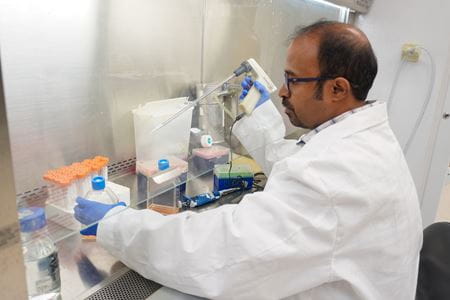INDIANAPOLIS — A new study by Indiana University School of Medicine researchers has revealed a breakthrough in the fight against acute myeloid leukemia, one of the most aggressive and fatal blood cancers in adults. The discovery of a previously unrecognized immune cell could lead to new therapies that are less treatment-resistant than current options for patients — meaning higher survival rates for people with blood cancers.
Acute myeloid leukemia is a cancer that begins in the bone marrow and leads to impaired blood cell formation and function. Currently the sixth-leading cause of cancer-related death in adults, acute myeloid leukemia is resistant to many treatment options and relapse is common.
"Despite transformative progress in the treatment of many blood cancers, acute myeloid leukemia therapies have remained largely unchanged for over three decades," said Reuben Kapur, PhD, director and program leader of the Hematologic Malignancies and Stem Cell Biology Program at the IU School of Medicine Herman B Wells Center for Pediatric Research, a researcher with the IU Melvin and Bren Simon Comprehensive Cancer Center and co-author of the study. "There’s a critical and urgent need for the development of more effective, less toxic, immune-based therapies that can truly shift the trajectory of acute myeloid leukemia treatment and improve long-term survival."
The study, recently published in Nature Communications, analyzed the roles of regulatory T cells, which are cells in the bone marrow that support the immune system. In preclinical studies using mouse models and human cells, the researchers found a specific type of regulatory T cell with a unique trait that stopped the cancer-fighting immune cells from being effective. These harmful cells build up in the bone marrow and protect the leukemia, making it more treatment resistant.
To solve this problem, the multi-institutional team led by Sophie Paczesny MD, PhD, co-leader of the Cancer Biology and Immunology Research Program at the Medical University of South Carolina Hollings Cancer Center, developed a targeted antibody therapy that removed the harmful cells and restored the immune system’s ability to fight the cancer and significantly improved survival.
"Our approach introduces a new therapeutic strategy with the potential to offer hope for patients with limited treatment options, paving the way for more effective and durable cancer immunotherapies," said Baskar Ramdas, PhD, co-author of the study and associate research professor of pediatrics at the IU School of Medicine. "It's designed to prevent relapse, enhance immune response and deliver lasting survival benefits for patients facing the toughest forms of cancer."
In the future, the researchers plan to advance their new antibody method toward clinical testing in acute myeloid leukemia patients. They will also explore whether the approach could offer a broader strategy for treating other cancers that suppress the immune system.
This research was supported by funding from the National Institutes of Health.
About the Indiana University School of Medicine
The IU School of Medicine is the largest medical school in the U.S. and is annually ranked among the top medical schools in the nation by U.S. News & World Report. The school offers high-quality medical education, access to leading medical research and rich campus life in nine Indiana cities, including rural and urban locations consistently recognized for livability. According to the Blue Ridge Institute for Medical Research, the IU School of Medicine ranks No. 13 in 2024 National Institutes of Health funding among all public medical schools in the country.
Writer: Jackie Maupin, jacmaup@iu.edu
For more news, visit the IU School of Medicine Newsroom: medicine.iu.edu/news




